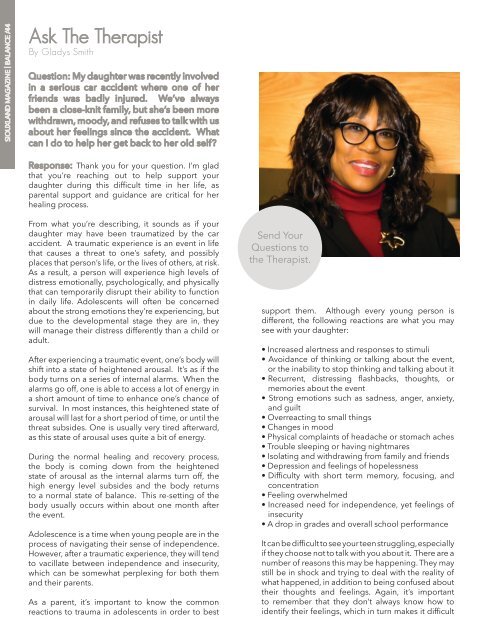Siouxland Magazine - Volume 3 Issue 5
Create successful ePaper yourself
Turn your PDF publications into a flip-book with our unique Google optimized e-Paper software.
<strong>Siouxland</strong> <strong>Magazine</strong> | Balance /44<br />
Ask The Therapist<br />
By Gladys Smith<br />
Question: My daughter was recently involved<br />
in a serious car accident where one of her<br />
friends was badly injured. We’ve always<br />
been a close-knit family, but she’s been more<br />
withdrawn, moody, and refuses to talk with us<br />
about her feelings since the accident. What<br />
can I do to help her get back to her old self?<br />
Response: Thank you for your question. I’m glad<br />
that you’re reaching out to help support your<br />
daughter during this difficult time in her life, as<br />
parental support and guidance are critical for her<br />
healing process.<br />
From what you’re describing, it sounds as if your<br />
daughter may have been traumatized by the car<br />
accident. A traumatic experience is an event in life<br />
that causes a threat to one’s safety, and possibly<br />
places that person’s life, or the lives of others, at risk.<br />
As a result, a person will experience high levels of<br />
distress emotionally, psychologically, and physically<br />
that can temporarily disrupt their ability to function<br />
in daily life. Adolescents will often be concerned<br />
about the strong emotions they’re experiencing, but<br />
due to the developmental stage they are in, they<br />
will manage their distress differently than a child or<br />
adult.<br />
After experiencing a traumatic event, one’s body will<br />
shift into a state of heightened arousal. It’s as if the<br />
body turns on a series of internal alarms. When the<br />
alarms go off, one is able to access a lot of energy in<br />
a short amount of time to enhance one’s chance of<br />
survival. In most instances, this heightened state of<br />
arousal will last for a short period of time, or until the<br />
threat subsides. One is usually very tired afterward,<br />
as this state of arousal uses quite a bit of energy.<br />
During the normal healing and recovery process,<br />
the body is coming down from the heightened<br />
state of arousal as the internal alarms turn off, the<br />
high energy level subsides and the body returns<br />
to a normal state of balance. This re-setting of the<br />
body usually occurs within about one month after<br />
the event.<br />
Adolescence is a time when young people are in the<br />
process of navigating their sense of independence.<br />
However, after a traumatic experience, they will tend<br />
to vacillate between independence and insecurity,<br />
which can be somewhat perplexing for both them<br />
and their parents.<br />
As a parent, it’s important to know the common<br />
reactions to trauma in adolescents in order to best<br />
Send Your<br />
Questions to<br />
the Therapist.<br />
support them. Although every young person is<br />
different, the following reactions are what you may<br />
see with your daughter:<br />
• Increased alertness and responses to stimuli<br />
• Avoidance of thinking or talking about the event,<br />
or the inability to stop thinking and talking about it<br />
• Recurrent, distressing flashbacks, thoughts, or<br />
memories about the event<br />
• Strong emotions such as sadness, anger, anxiety,<br />
and guilt<br />
• Overreacting to small things<br />
• Changes in mood<br />
• Physical complaints of headache or stomach aches<br />
• Trouble sleeping or having nightmares<br />
• Isolating and withdrawing from family and friends<br />
• Depression and feelings of hopelessness<br />
• Difficulty with short term memory, focusing, and<br />
concentration<br />
• Feeling overwhelmed<br />
• Increased need for independence, yet feelings of<br />
insecurity<br />
• A drop in grades and overall school performance<br />
It can be difficult to see your teen struggling, especially<br />
if they choose not to talk with you about it. There are a<br />
number of reasons this may be happening. They may<br />
still be in shock and trying to deal with the reality of<br />
what happened, in addition to being confused about<br />
their thoughts and feelings. Again, it’s important<br />
to remember that they don’t always know how to<br />
identify their feelings, which in turn makes it difficult


















